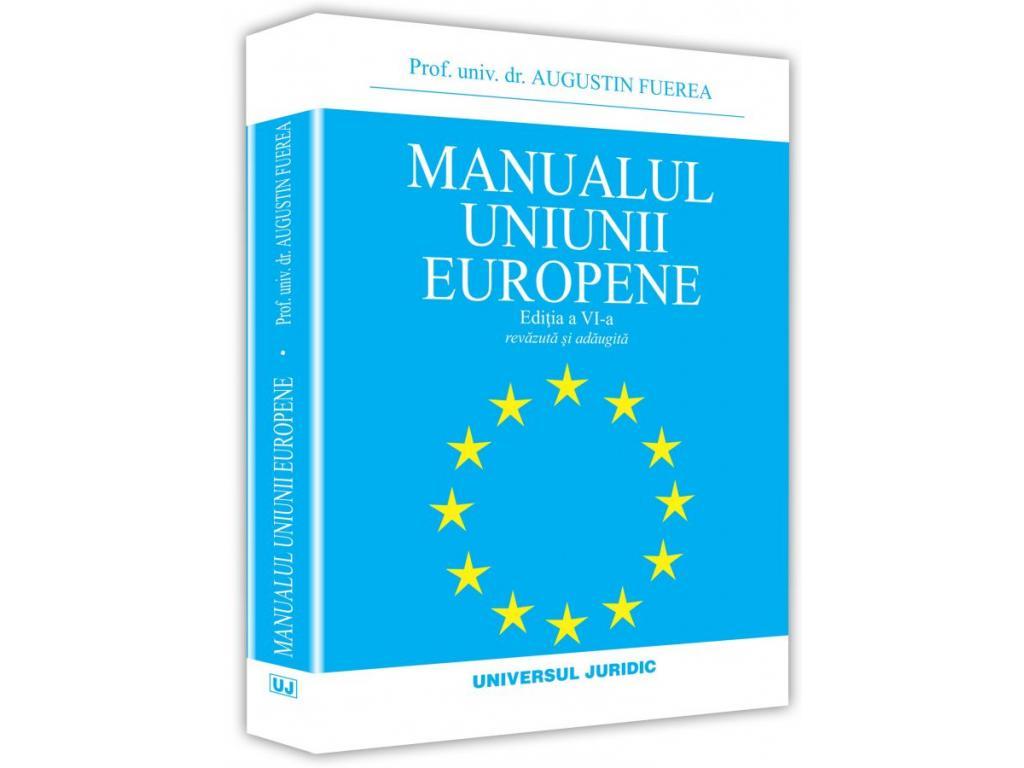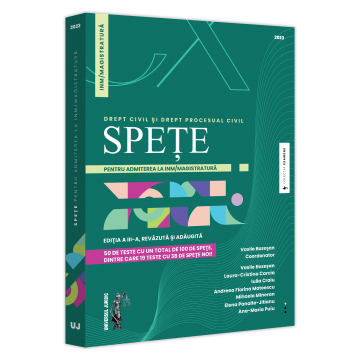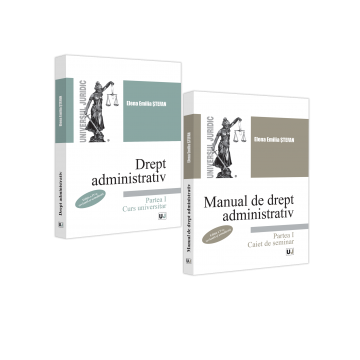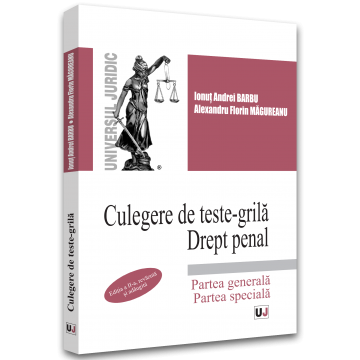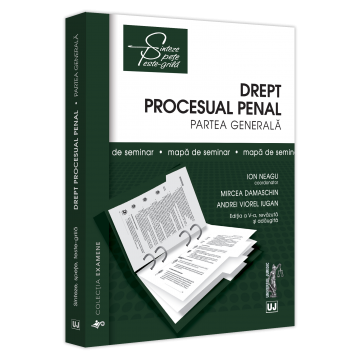Propuneri manuscrise: info@editurauniversitara.ro: 0745 204 115
Urmarire comenzi Persoane fizice / Vanzari: 0745 200 718 / 0745 200 357 / Comenzi Persoane juridice: 0721 722 783
6359.png) Administrative Liability of EU Funding Recipients for Breach of Procurement Rules. Emphasis on the Cases of Romania and Italy
Administrative Liability of EU Funding Recipients for Breach of Procurement Rules. Emphasis on the Cases of Romania and Italy
ISBN: 978-606-28-1050-4
DOI: 10.5682/9786062810504
Anul publicării: 2020
Editia: I
Pagini: 346
Editura: Editura Universitara
Autor: Demis-M. Sparios
- Descriere
- Download (1)
- Autori
- Cuprins
- Cuvant inainte
- Unde se gaseste
- Review-uri (0)
The importance of the Cohesion Policy, developed by the European Union in order to reduce the economic disparities between its various regions, for the newest, as well as for the oldest of its Member States, is indisputable.
The weighting of this policy within the balance of main interests of the EU is also an important one and is reflected in the big number of general and specific legal norms that regulate this field at the EU level. These norms are aimed at ensuring the effective assistance provided by the EU to the less developed regions, as well as the proper protection of the financial interests of the Union. This protection is ensured mainly by sanctioning the illicit behaviours of the beneficiaries of the financial assistance, the procedure and conditions of this sanctioning being regulated in detail both at EU level and, especially, at the national level, in the Member States.
The regulation of the management and use of the financial assistance delivered through the EU's Cohesion Policy, including the sanctioning of unlawful behaviours of the beneficiaries, is mostly technical and practical. It is thus not easy to define from the point of view of the legal theory, meaning that the illicit deeds sanctioned by the EU and national law in this field, as well as the sanctions themselves are not expressly attributed to a widely recognised pattern, such as the legal responsibility (liability).
Neither the legislation, at EU or national levels, nor the judicial practice (with very few exceptions3) refer to the existence of a liability triggered by the occurrence of irregularities during the use of EU financial assistance. As regards the doctrine, although there have been some references to such a liability, one cannot consider that there is already a theory built in this regard.
The present study aims, in these conditions, at bringing a contribution to the construction of the theory of the liability entailed by the commission of irregularities in the public procurement procedures used within the projects financed by EU structural and investment funds (ESIF).
In order to achieve its aim, the book will look at the concept and nature of this liability, at its elements, as well as at the procedure to be complied with in the process of triggering this liability. The liability will be looked at in general, but also its specificities at the national levels of Romania and Italy will be analysed.
The present study has its importance not only from a theoretical point of view, but also from a practical one. Thus, the clarification of what the nature of the liability at hand is, will help to the identification of the principles applicable to this type of liability. Therewith, following the identification of elements of the liability and of their specific features, the finding of irregularities and the determination of the applicable sanctions (financial corrections) will become more accurate and easier. Furthermore, by establishing the nature of the sanctions (financial corrections), the identification of the legal rules applicable to them will be easier and clearer.
-
Administrative Liability of EU Funding Recipients for Breach of Procurement Rules. Emphasis on the Cases of Romania and Italy
Descarca
Demis-Marius Sparios, Judge at Brasov Court of Appeal -Chamber for Administrative and Tax Litigation, holds a PhD in Administrative Law from „Babes-Bolyai" University of Cluj-Napoca and the University of Turin (joint PhD).
This book is based on the PhD thesis publicly defended by the author on 8 July 2019. It approaches the subject-matter of the liability entailed by the commission of irregularities within the projects financed by EU Funds. The analysis performed in the book looks especially at irregularities committed by breach of public procurement rules, with an in-depth and comparative examination of all elements of this liability, as well as of the administrative and judicial proceedings entailed by the finding of these irregularities.
Reference is made to the general framework of the EU, as well as to the specific situations of Romania and Italy. The book represents an original study in a field that has been rarely approached by the doctrine and may be very useful to practitioners, academics and beneficiaries having an interest with regard to the EU Funds Law.
ACKNOWLEDGMENTS/ 5
LIST OF ABBREVIATIONS/ 7
CHAPTER 1
INTRODUCTION / 13
1.1. PROLEGOMENA / 13
1.2. THE RELEVANCE AND THE LIMITS OF THE RESEARCH/ 14
1.3. THE STRUCTURE OF THE BOOK /16
1.4. THE RESEARCH METHODOLOGY AND QUESTIONS/ 19
CHAPTER 2
THE LEGISLATIVE FRAMEWORK / 23
2.1. THE EU LEGISLATIVE FRAMEWORK / 23
2.1.1. The Cohesion Policy and its legal framework / 23
2.1.2. Shared management/ 29
2.1.3. Public procurement rules / 37
2.2. THE ROMANIAN LEGISLATIVE FRAMEWORK / 42
2.2.1. „Transposition” of a Regulation / 42
2.2.2. Procedural issues / 45
2.2.3. The temporal application of the national law / 49
2.2.4. Secondary legislation / 53
2.2.5. Public procurement rules/ 58
2.3. THE ITALIAN LEGISLATIVE FRAMEWORK / 58
2.3.1. Direct Application of Regulations / 58
2.3.2. Decrees of the President / 59
2.3.3. Public procurement rules / 65
2.4. CONCLUSIONS TO THIS CHAPTER / 66
CHAPTER 3
THE LIABILITY: CONCEPT AND ELEMENTS / 69
3.1. INTRODUCTION / 69
3.2. IS LIABILITY A SUITABLE CONCEPT? / 70
3.3. THE LEGAL NATURE OF THE LIABILITY FOR MISUSE OF ESI FUNDS/ 74
3.3.1. Criminal vs Non-criminal nature / 74
3.3.2. Fiscal Liability?/ 75
3.3.3. Liability in Tort? / 77
3.3.4. Administrative Liability / 77
3.4. THE CONSTITUTING ELEMENTS OF THE LIABILITY/ 80
3.4.1. The Irregularity / 81
3.4.1.1. Definition(s) and classification(s)/ 81
3.4.1.2. Clasification(s) / 88
3.4.1.3. The Illicit Deed / 92
3.4.1.4. The prejudice / 157
3.4.1.5. The Causal Link/ 161
3.4.1.6. The Guilt / 165
3.4.1.7. Delimitation between the Irregularity and the Fraud / 168
3.4.2. The Financial Correction/ 175
3.4.2.1. General Considerations/ 175
3.4.2.2. The Legal Nature of the Financial Correction / 177
3.4.2.3. Types of Financial Corrections / 180
3.4.2.4. The Proportionality – a Core Principle of the Liability Procedure / 187
3.5. CONCLUSIONS TO THIS CHAPTER/ 195
CHAPTER 4
ADMINISTRATIVE CONTROLS AND OVERSIGHT / 207
4.1. GENERAL CONSIDERATIONS/ 207
4.2. COMPETENT AUTHORITIES / 208
4.2.1. The General Framework / 208
4.2.2. The Romanian Management and Control System / 214
4.2.2.1. The National Agency for Public Procurement / 217
4.2.2.2. The Audit Authority/ 225
4.2.2.3. DLAF / 226
4.2.3. The Management and Control System in Italy / 227
4.2.3.1. General Considerations and the Designated Authorities/ 227
4.2.3.2. The Court of Auditors / 229
4.2.3.3. The Italian National Anti-Corruption Authority (ANAC) / 231
4.3. THE ADMINISTRATIVE CONTROL PROCEEDINGS/ 232
4.3.1. The Administrative Proceedings in Romania/ 233
4.3.2. The Administrative Proceedings in Italy / 239
4.4. CONCLUSIONS TO THIS CHAPTER / 243
CHAPTER 5
REMEDIES AND JUDICIAL PROTECTION / 251
5.1. GENERAL CONSIDERATIONS/ 251
5.2. THE ROMANIAN FRAMEWORK / 253
5.2.1. The Administrative Appeal/ 253
5.2.2. Court Proceedings / 256
5.2.3. The Interim Measures/ 271
5.3. THE ITALIAN FRAMEWORK./ 280
5.4. THE BIG CLASHES: ACTIONS OF MEMBER STATES AGAINST THE ACTS ISSUED BY THE COMMISSION/ 291
5.4.1. The Right to Action/ 291
5.4.2. The Appeal/ 300
5.4.3. Interim Measures/ 302
5.5. CONCLUSIONS TO THIS CHAPTER/ 304
CHAPTER 6
OVERVIEW OF THE RESEARCH AND GENERAL CONCLUSIONS TO THE BOOK/ 309
6.1. OVERVIEW OF THE RESEARCH CARRIED OUT / 309
6.2. GENERAL CONCLUSIONS / 310
BIBLIOGRAPHY: / 326
I. BOOKS AND BOOK CHAPTERS:/ 326
II. ARTICLES AND STUDIES: / 331
III. CASE-LAW OF ECJ AND JUDICIAL PRACTICE OF NATIONAL COURTS:/ 342
IV. REPORTS AND OTHER TYPES OF PUBLICATIONS:/ 344
The weighting of this policy within the balance of main interests of the EU is also an important one and is reflected in the big number of general and specific legal norms that regulate this field at the EU level. These norms are aimed at ensuring the effective assistance provided by the EU to the less developed regions, as well as the proper protection of the financial interests of the Union. This protection is ensured mainly by sanctioning the illicit behaviours of the beneficiaries of the financial assistance, the procedure and conditions of this sanctioning being regulated in detail both at EU level and, especially, at the national level, in the Member States.
The regulation of the management and use of the financial assistance delivered through the EU's Cohesion Policy, including the sanctioning of unlawful behaviours of the beneficiaries, is mostly technical and practical. It is thus not easy to define from the point of view of the legal theory, meaning that the illicit deeds sanctioned by the EU and national law in this field, as well as the sanctions themselves are not expressly attributed to a widely recognised pattern, such as the legal responsibility (liability).
Neither the legislation, at EU or national levels, nor the judicial practice (with very few exceptions3) refer to the existence of a liability triggered by the occurrence of irregularities during the use of EU financial assistance. As regards the doctrine, although there have been some references to such a liability, one cannot consider that there is already a theory built in this regard.
The present study aims, in these conditions, at bringing a contribution to the construction of the theory of the liability entailed by the commission of irregularities in the public procurement procedures used within the projects financed by EU structural and investment funds (ESIF).
In order to achieve its aim, the book will look at the concept and nature of this liability, at its elements, as well as at the procedure to be complied with in the process of triggering this liability. The liability will be looked at in general, but also its specificities at the national levels of Romania and Italy will be analysed.
The present study has its importance not only from a theoretical point of view, but also from a practical one. Thus, the clarification of what the nature of the liability at hand is, will help to the identification of the principles applicable to this type of liability. Therewith, following the identification of elements of the liability and of their specific features, the finding of irregularities and the determination of the applicable sanctions (financial corrections) will become more accurate and easier. Furthermore, by establishing the nature of the sanctions (financial corrections), the identification of the legal rules applicable to them will be easier and clearer.
Suport clienti Luni - Vineri intre 8.00 - 16.00
0745 200 718 0745 200 357 comenzi@editurauniversitara.ro
![Administrative Liability of EU Funding Recipients for Breach of Procurement Rules. Emphasis on the Cases of Romania and Italy [1] Administrative Liability of EU Funding Recipients for Breach of Procurement Rules. Emphasis on the Cases of Romania and Italy [1]](https://gomagcdn.ro/domains/editurauniversitara.ro/files/product/large/administrative-liability-of-eu-funding-recipients-for-breach-of-procurement-rules-emphasis-on-the-cases-of-romania-and-italy-6-179136.jpg)



